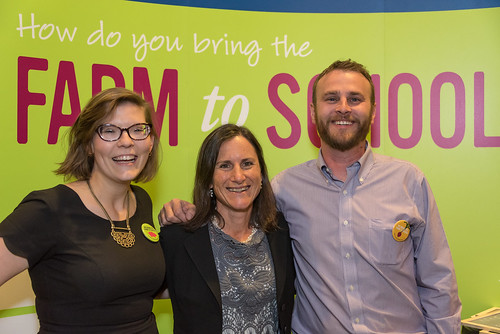
Matt Russell (right) with his USDA colleagues Christina Conell (left) and Deborah Kane (center), at the 2015 USDA Farm to School Grantee Gathering in Denver, CO. The annual gathering is an opportunity for Farm to School grantees from across the country to meet face to face, network and share best practices.
“The term ‘farm to school’ involves thinking of the whole plate, so to speak. It’s about increasing the amount of local and regional foods served in school cafeterias while also increasing education and community outreach for kids, and creating market opportunities for producers.”
So says Matt Russell, Grant Program Manager for the Farm to School Program at USDA’s Food and Nutrition Service (FNS). Matt works to support school districts, non-profits, and other stakeholders in bringing more local and regional food into the school meal program.
Matt came to USDA in 2009 and immediately joined the newly established Know Your Farmer, Know Your Food (KYF2) Task Force. Then, the Task Force was an emerging network of USDA experts on local food. It has since become the core of the USDA’s Know Your Farmer, Know Your Food Initiative and coordinates the Department’s work on local and regional food systems.
“The Know Your Farmer, Know Your Food Initiative has always been a great opportunity to meet and learn from folks who are working on other local and regional food projects, such as the Specialty Crop Block Grants and Local Food Promotion Programs, that are supporting farm to school efforts,” says Matt.
Farm to school initiatives have been a priority for the Know Your Farmer, Know Your Food Initiative since 2009. Through KYF2, several agencies across the Department were able to participate in a working group to study how schools were using local food in their cafeterias. “Under the KYF2 umbrella, we met with schools and communities across the country to learn about their farm to school programs,” remembers Matt. The working group discovered that schools were actively participating in farm to school efforts, despite limited kitchen facilities, unreliable suppliers and other challenges. Over the past six years, many of these issues have been addressed, including support for school kitchen equipment, investments in food hubs that can facilitate easier local food deliveries and efforts to strengthen the farm to school supply chain.
Thanks in part to the lessons learned through the working group, USDA’s Farm to School Program was formally established through the 2010 Healthy Hunger Free Kids Act. Farm to school grantees and other USDA investments in farm to school efforts are on the USDA’s Know Your Farmer, Know Your Food Compass which maps over 4,100 federally funded local food projects.
The USDA Farm to School Program does much more than provide grants, however. Staff provide training and technical assistance to schools all across the country and conduct research and evaluation regarding the most effective methods for incorporating local foods in the school menu. The team also conducts a bi-annual USDA Farm to School Census. In addition, each year, Matt and his team hold a “Grantee Gathering” for all of the grantees from across the country. This past year, the 2015 USDA Farm to School Grantee Gathering was held in Denver, Colorado, and brought together almost 100 representatives from grant projects from 32 states in the country. “It is a really important part of the grantee experience and a great way for us to provide technical assistance,” says Matt. “It’s also just fun to see everyone in the room together and all of the great work that we do.”
Matt’s vision for farm to school efforts is that local and regional foods become a regular part of the school meal program across the country on a day-to-day basis. Working with other USDA local food experts through the Know Your Farmer, Know Your Food Task Force will help make that a reality.
No comments:
Post a Comment